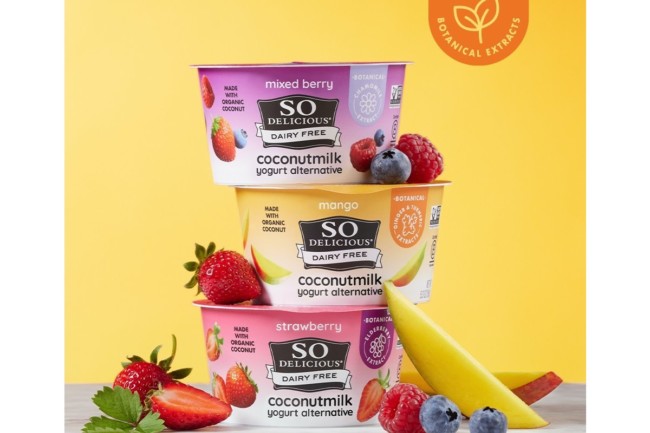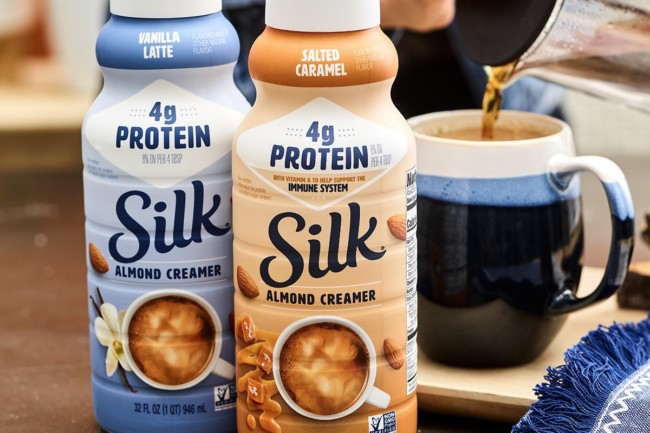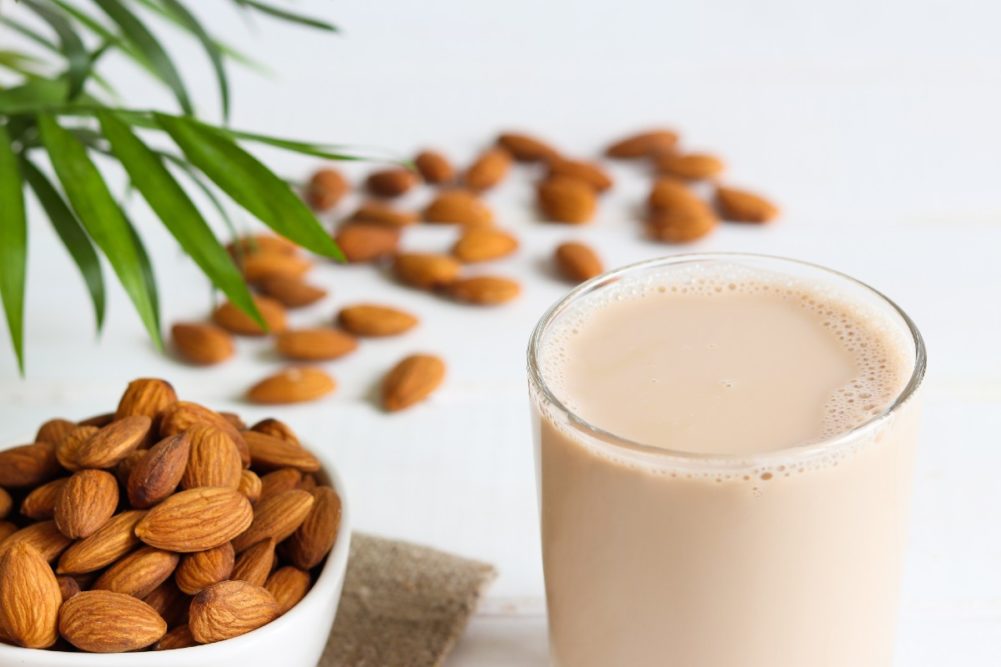Some of the world’s leading dairy businesses, or food majors with a significant position in dairy, are becoming ever more involved in providing dairy alternatives.
While not turning their backs on traditional dairy products, companies like Dairy Farmers of America, HP Hood, Bel Group, Unilever, Saputo, Chobani and Danone North America are understanding that the market for plant-based yogurt, cheese and ice cream, and especially milk and coffee creamers, is growing rapidly and too important to ignore.
According to a recent report from the Plant-Based Foods Association, over the past three years, plant-based milk alternatives have grown 33% in sales, increasing by 4% in 2021 alone, creating the largest category of retail sales in the plant-based market at $2.6 billion.
Plant-based milk alternatives are now the growth engine for the entire milk category, contributing $105 million in growth, and plant-based creamer (+33%) and ready to drink beverages (+22%) saw the highest growth percentages in 2021.
These plant-based alternatives continue to revolutionize the dairy industry, and consumer demand has skyrocketed in the past few years.
Plant-based pioneer
According to plant-based trailblazer Danone North America, consumers expect high-quality taste, texture and variety from plant-based options.
“And we’ve been able to deliver that with our milk alternative and plant-based creamer offerings within Danone North America’s Silk and So Delicious Dairy Free portfolio,” said John Starkey, president of plant-based food and beverages for Danone North America. “Consumers’ evolving, heightened expectation of plant-based are that these products closely mimic the animal alternative. Taste remains a top priority because we know that 53% of consumers cite taste as a top barrier for not buying plant-based dairy alternatives. By producing great-tasting products, we’ve had the opportunity to welcome more reluctant dairy lovers into the plant-based category.”
Looking at the top performing plant-based beverages, Starkey said almond milk continues to lead the way, accounting for 59% of the total plant-based milk alternative category.
“We attribute this to the fact that nearly three-quarters of consumers start their plant-based journey with almond milk and the Silk almond portfolio — including our newest addition, Silk Extra Creamy Almond milk — is a great introduction to plant-based alternatives,” he said.
 Photo: So Delicious Dairy Free
Photo: So Delicious Dairy Free
Starkey said, in under three years, oat milk has risen from newcomer in the plant-based space to one of the most frequently purchased plant-based beverages — becoming the second-largest plant-based milk alternative segment, attributing to 17% of sales of the plant-based milk alternative category.
“Strong category growth like this proves oat is a favorite in plant-based offerings and will continue to be for some time,” he said.
In early March, Danone SA announced first-quarter sales for the period ended March 31 rose 7.1% to €6,236 million ($6,770 million).Part of the growth was attributed to plant-based product sales.
In addition to great taste, Starkey said, sustainability is another key motivator for milk alternative consumers across all demographics.
“At its core, eating a plant-based diet is already a sustainable advantage; plant-based food and beverages provide more options with less of an impact on the planet because they require fewer resources to produce,” he said. “With Silk and So Delicious, Danone North America is spearheading the plant-based category — this movement is challenging the perception of what plants are truly capable of, and providing more options that have less of an impact on the planet. Take water, for instance — making a half gallon of Silk takes 64% less water than a half-gallon of U.S. conventional dairy milk— a key example of how plant-based diets can help protect and conserve our planet’s precious resources.”
Plant-based portfolio
Silk’s plant-based beverages include Almondmilk, Oatmilk, Cashewmilk, Soymilk, Coconutmilk, Silk Protein and, the newest addition to Silk’s beverages, Nextmilk.
Consumers are continuing to prioritize personal health and are looking for plant-based products that help support a healthy lifestyle, Starkey said.
“Danone’s Silk Nextmilk was created with the experience of traditional dairy in mind, not only in taste and texture, but also from a nutritional standpoint,” he said.
Silk also offers many plant-based creamers, including Oat Creamers in flavors like new Sweet Oat Latte Creamer, Almond Creamers in year-round and seasonal flavors, Soy Creamers, Dairy-Free Heavy Whipping Cream, Dairy-Free Half & Half Alternative and Enhanced Almond Creamers.
“Silk is welcoming traditional dairy consumers to the future of plant-based beverages with new Silk Nextmilk, made with a blend of plants designed to deliver on key attributes of dairy milk, like taste and texture,” Starkey said. “Silk Nextmilk is an excellent source of six key nutrients found in dairy, including calcium, vitamin D, vitamin A, B12, riboflavin and phosphorus. It’s now available in Whole Fat and Reduced Fat varieties in multi-serve cartons in the refrigerated section at grocery stores nationwide.”
Silk also recently released Silk Extra Creamy Almondmilk, which is made with a blend of three kinds of almonds.
 Photo: Silk
Photo: Silk
“With all new products, we strive for excellence in both taste and nutrition — so this new Almondmilk has 50% more calcium than reduced fat milk, is an excellent source of calcium and vitamin E, and has zero grams of cholesterol,” Starkey said.
Danone North America also just launched Silk Enhanced Almond Creamers in response to consumers looking for more functional nutrition in their day. Silk Enhanced Creamers are Non-GMO Project Verified, certified vegan, and free from gluten, cholesterol, carrageenan and artificial colors and flavors.
The company’s So Delicious Dairy Free offers plant-based and flexitarian consumers an assortment of dairy-free beverages, including new Wondermilk, Coconutmilk beverages in shelf-stable and refrigerated options, as well as rich, creamy and organic Coconutmilk Creamers. It’s available in two varieties, Whole Fat and Reduced Fat, and is made with a blend of smooth oats, creamy coconuts and crisp soy.
Bridging the gap
At Danone North America, continued innovation is key, Starkey said.
“For instance, we pioneered a new dairy-like segment of plant-based beverages — addressing the huge barrier of taste head-on — to bring reluctant dairy lovers into plant-based. These offerings will help consumers overcome their plant-based taste hang-ups and aim to bring in the next wave of massive growth to the plant-based category,” he said. “This requires creating truly innovative and differentiated products that meet those taste expectations and provide a dairy-like experience — and we’ve done just that with new Silk Nextmilk and So Delicious Wondermilk.”
Danone North America is always researching new formulations, ingredients and flavors that might appeal to plant-based eaters and flexitarians alike, in addition to keeping an eye on consumer buying behavior and trends.
“As we work to alleviate consumer skepticism toward plant-based products, we’re committed to continuously improving our offerings by testing changes in sensory experience, nutrition profile and agricultural quality of our ingredients,” Starkey said. There’s a huge opportunity to close the gap between traditional dairy and plant-based beverage household penetration, Starkey said, as 91% of households buy traditional dairy, while 43% of households buy plant-based beverages. This presents a nearly 50% gap, and a big opportunity to address consumer taste barriers while growing the business.
Even as plant-based demand continues to grow, Starkey said some consumers remain skeptical about plant-based offerings, specifically their taste and texture, with 53% of people saying they wouldn’t purchase plant-based products because of taste.
“Helping consumers overcome their plant-based taste hang-ups — and bringing in the next wave of massive growth to the plant-based category — was going to require creating truly innovative and differentiated products that meet those taste expectations and deliver on the attributes of dairy,” Starkey said.
The future
The plant-based segment is a big part of Danone North America’s future, Starkey said.
“With Silk and So Delicious Dairy Free pioneering the category and maintaining leadership, we know we can continue to find ways to alleviate skepticism around plant-based beverages, while also acknowledging that there’s room for both traditional dairy and dairy-free alternatives in consumers’ fridges,” he said. “You may think plant-based beverage interest is only fueled by strict vegans and vegetarians, but our consumers are vegan, vegetarian, flexitarian or just looking to lower their dairy intake, though always looking for delicious options, whether focused on taste or health.”
Plant-based consumers are also diverse in nature, Starkey said, including Gen Z and Millennials, often experimenting with plant-based options and trends, to Gen X and Boomers who are often frequent Silk buyers.
“Of note, when you look across demographics, one holistic community stands out as really driving adoption for plant-based: multicultural consumers,” he said.
Danone North America recently conducted a survey of more than 4,000 multicultural consumers, inclusive of Hispanic, Black and Asian American communities, to better understand their interest in the category and found that plant-based eating is on the rise among multicultural audiences, especially the younger millennial and Gen-Z populations.
“In fact, we found that over 60% of multicultural consumers are open to plant-based alternatives,” Starkey said. “Our hope for the future is continued growth in the plant-based category so we can meet consumers’ needs with a wide variety of offerings that deliver new flavor experiences and challenge the perception of what plants are capable of providing.”

